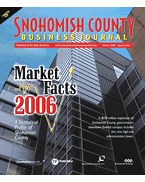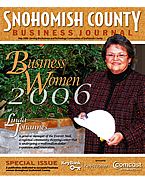 |
|
|
YOUR
COUNTY.
|
YOUR
BUSINESS JOURNAL.
|
Published February 2006
Lawmakers
should
pull plug on gain sharing
By
Don Brunell
Guest Editorial
Remember when your mom used to say, “If something sounds too good to be true, it probably is?” Well, state lawmakers should heed that advice.
In 1998, the state legislature approved a “gain sharing” plan that was supposed to use stock-market gains to augment pension benefits for state employees — at no cost. It was a bad idea.
Now, the program has self-destructed, leaving the state with a $2 billion pension liability, and lawmakers are thinking about killing it. They should do that before things get any worse.
This is what happened.
The state invests about $50 billion worth of retirement funds in stocks, bonds and other investments. The proceeds help fund the lion’s share of pensions for state employees. Individual state workers also contribute to their pensions through payroll deductions.
In two of the state’s pension plans, the employees’ contributions are the same each month. Under the third plan, the amount of the employee contribution varies, depending on how well the stock market is doing. The higher the stock-market return, the less the employee pays. But there is a downside if market returns fall below a certain point: The employees’ contribution increases.
Back in the ’90s when the market was flying high, the state employees who paid the same each month complained that they weren’t sharing in the stock-market gains. In other words, they wanted the rewards, but not the risk.
The Legislature obliged with gain sharing. Under gain sharing, if stock-market returns exceeded 10 percent a year for four years, half the excess was dispersed to the state employees and pensioners. The program was supposed to pay for itself.
But there was a flaw. Because of the way the law was written, the gain-sharing payments permanently increased pension benefits for tens of thousands of state workers. In other words, what was supposed to have been a short-term benefit became a long-term obligation — and taxpayers ended up holding the bag.
To date, the Legislature’s “no cost” gain-sharing program has increased the state’s pension obligation by $2 billion. Fortunately, the legislation contains a “kill switch” that allows lawmakers to end the gain-sharing program at any time. They should do just that, and the sooner the better.
But more than that, they should take a lesson from what happened. Benefits have costs. There is no free lunch. If you provide a benefit, you must be able to pay for it.
Millions of private-sector employees have 401(k) accounts, which are invested in the stock market. In good times, they reap the rewards, but when the market lags, they take their losses and wait for things to turn around. The attempt by the state to rewrite the laws of economics by providing state workers with rewards but no risks was doomed to fail — and they should learn from this multibillion-dollar blunder.
Some say that rather than kill the gain-sharing program, lawmakers will simply delay making the needed payments, as they have in the past. That would be a BIG mistake. Delaying payment only increases the ultimate cost and makes matters worse.
Lawmakers should own up to their mistake and kill the gain-sharing program. It was a bad idea. It still is.
Don Brunell is president of the Association of Washington Business, Washington state’s chamber of commerce. For more information on the AWB, go online to www.awb.org.













